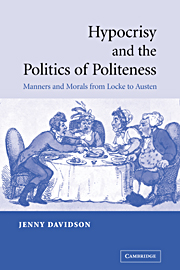Book contents
- Frontmatter
- Contents
- Acknowledgments
- Introduction: The revolution in manners in eighteenth-century prose
- 1 Hypocrisy and the servant problem
- 2 Gallantry, adultery and the principles of politeness
- 3 Revolutions in female manners
- 4 Hypocrisy and the novel I: Pamela, or Virtue Rewarded
- 5 Hypocrisy and the novel II: a modest question about Mansfield Park
- Coda: Politeness and its costs
- Notes
- Bibliography
- Index
Coda: Politeness and its costs
Published online by Cambridge University Press: 22 September 2009
- Frontmatter
- Contents
- Acknowledgments
- Introduction: The revolution in manners in eighteenth-century prose
- 1 Hypocrisy and the servant problem
- 2 Gallantry, adultery and the principles of politeness
- 3 Revolutions in female manners
- 4 Hypocrisy and the novel I: Pamela, or Virtue Rewarded
- 5 Hypocrisy and the novel II: a modest question about Mansfield Park
- Coda: Politeness and its costs
- Notes
- Bibliography
- Index
Summary
One of the most common mistakes in asking for support is the use of could and can in place of would and will. “Could you empty the trash?” is merely a question gathering information. “Would you empty the trash?” is a request.
Women often use “could you?” indirectly to imply “would you?” As I mentioned before, indirect requests are a turnoff …
On Mars it would be an insult to ask a man “Can you empty the trash?” Of course he can empty the trash! The question is not can he empty the trash but will he empty the trash. After he has been insulted, he may say no just because you have irritated him.
John Gray, Ph.D., Men Are From Mars, Women are From Venus: A Practical Guide for Improving Communication and Getting What you Want in Your Relationships
(1992)It doesn't matter if you're not a beauty queen, that you never finished college, or that you don't keep up with current events. You still think you're enough! You have more confidence than women with MBAs or money in the bank. You don't grovel. You're not desperate or anxious. You don't date men who don't want you. You trust in the abundance and goodness of the universe: if not him, someone better, you say. You don't settle. You don't chase anyone. You don't use sex to make men love you. You believe in love and marriage. You're not cynical.
- Type
- Chapter
- Information
- Hypocrisy and the Politics of PolitenessManners and Morals from Locke to Austen, pp. 170 - 179Publisher: Cambridge University PressPrint publication year: 2004

